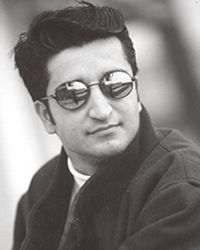Raghuveer Shekhawat's tryst with television started when he came to Mumbai in 1992 with vague notions of making it big in the entertainment industry.
Almost a decade later, he has carved a niche for himself as a writer of hugely successful comedy serials. Family No.1, Mr. & Mrs. Chanchala, Apun To Bas Vaise Hai, Yeh Hai Mere Apne and many other slapstick and subtly satirical serials figure in his portfolio. 29 year old Shekhavat is however, modesty personified. As against many disgruntled writers, he is honest to admit that he would have been struggling for a livelihood, had he not been a TV writer. Indiantelevision.com's correspondent Amar met Shekhavat to find out what makes the man tick. Excerpts:
How did you become a writer?
Actually, it was not planned. When I came to Mumbai, I just knew that I wanted to do something in the world of cinema and be associated with the medium. I liked writing poetry and happened to be under the tutelage of a poet, Harshad Shivsharan, for a week. At the end of the week, I knew that all I wanted to do in life was be a writer. Since TV was really happening in those days - the early nineties - with so many private channels coming up, I could easily break into TV writing.
What are the natural instincts required of a successful writer?
A writer needs to be a good observer. Besides, he needs to have the right understanding and feel of emotions.
Why did you specialize in comedy?
It's an inherent tendency with me to contribute some humour to an environment overshadowed by tension and pressure. The orientation to comedy has been a natural one for me and I have immensely enjoyed writing comedies.
Where do you draw your inspiration from while creating comic characters?
The inspiration comes from people around me. I basically have to improvise on the characters I see all around, because almost everybody has a funny side to him/her. Also, one has to be observant of the way people around walk, talk and their peculiar gestures.
How important is effective narration in selling a story?
Very important. The characters come out much better in a narration vis-?-vis on paper, because the innate traits of the character can be explained that much better in a narration. But having said that, let me also add that in the initial stages people seldom give freshers the opportunity for a narration.
Do you write in English or Hindi?
I write in Hindi.
 |
Comedy is the toughest to write, because human nature is such that it cries or cribs more easily than laughing.
__________ |
What is your writing schedule?
It's a little odd. I start writing at nine in the evening and go upto four in the morning. During the day, I'm normally engaged in meetings. Of course, its tough on my family life but then my wife has adapted well to it.
How much time does it take you to write one episode?
On an average, it takes me a day to complete the entire story, screenplay and dialogues of one episode. At most, it takes me two days.
How many serials can you work on simultaneously?
I feel I can work on four projects that are on air simultaneously and do justice to all of them. Beyond that, the thought process sags.
Does TV writing pay well?
I should like to think so (laughs). Otherwise, a person like me would be struggling for a livelihood.
Is writing a comedy easy or difficult vis-?-vis writing drama?
Comedy is the toughest, because human nature is such that it cries or cribs more easily compared to laugh. To create intelligent yet funny situations actually requires a lot of brainstorming. A slight slip in focus can make the comedy appear imposed or convoluted. You will see that even among writers, comedy and horror are specialized genres which not many writers venture into.
|
The wide variety of subjects that you can explore on TV is something you cannot do in cinema.
__________ |
 A still from Family No. 1 |
Have you ever felt saturated or exhausted in your thought process when writing?
It's happened at times to me. Mostly, it's been temporary and mainly this has happened on account of a particular direction the director has insisted that the story move in. Then there are times when a certain artiste's dates have not been available and the story has had to be reworked because of this. But these are sporadic incidences. Where my career is concerned, I have never been exhausted of ideas.
Have you felt hassled by the channel EPs over the storyline?
People complain a lot about channel interference, but frankly I feel no other medium can provide you the kind of freedom TV does. The wide variety of subjects that you can explore on TV is something you cannot do in cinema. There have been times when the channel has overruled me, but I've taken it in my stride. Besides, I've also realized that most of the times, channels interfere because they don't feel secure with a new or inexperienced writer. Once the writer has gained in stature and credibility, the channels start approving his work without hassles.
Is there a particular genre you would not like to venture into?
No. Though I love writing comedy, at the end of my career, I would like to be seen as having excelled in all genres.
Which has been the most challenging assignment of your career?
It's a comedy film I'm writing for a new director, Sameer Kale. Writing a film is a new experience for me and that puts me under pressure to do a great job of it.
Which has been the happiest moment of your career?
It was last year when Family No.1 written by me was adjudged the third best sitcom at the Asian TV awards.






